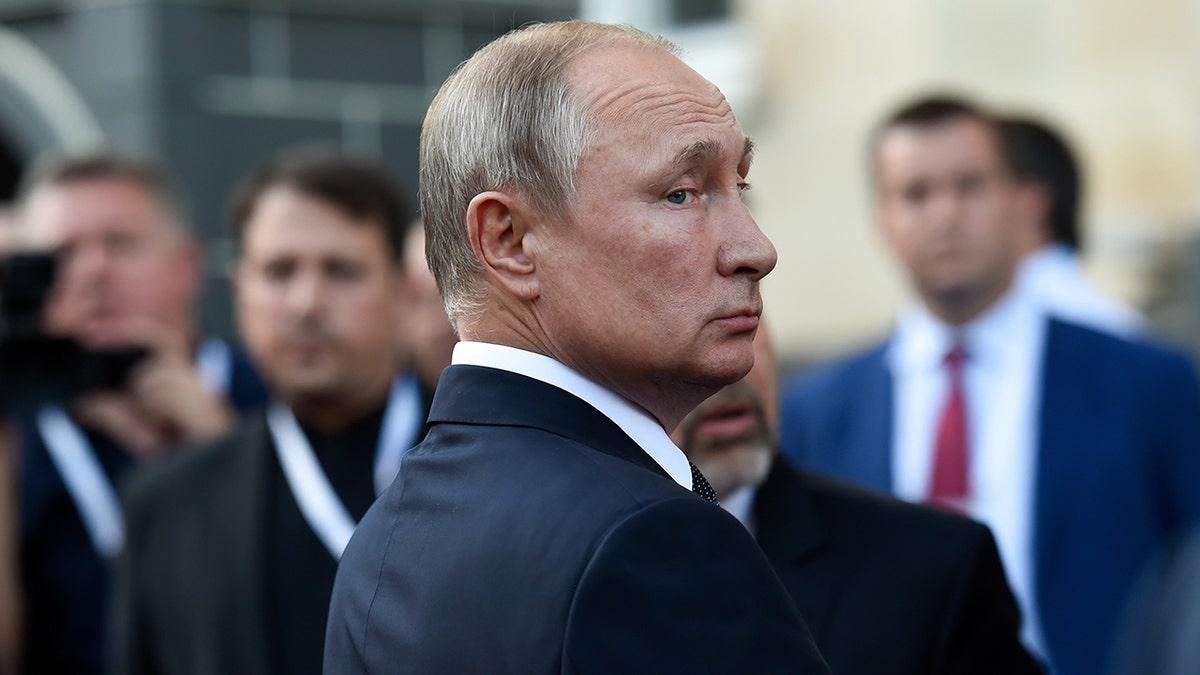House Democrat Moulton says Biden could have acted sooner in Ukraine
Rep. Seth Moulton, D-Mass., told ‘America's Newsroom’ that President Biden should have increased aid to Ukraine last year to deter the Russian invasion.
"Americans, in your great history you would understand Ukrainians. Understand us now. We need you right now."
That was a powerful moment during President Volodymyr Zelenskyy’s speech to Congress. But the most powerful moment, as I sat with all of my colleagues, was when he showed a video of Russia’s horrific destruction, including the wounded and dead bodies of dozens of children. As a father, it was heart-wrenching. Many of us had tears in our eyes.

Russian President Vladimir Putin attends a meeting of the Supreme Eurasian Economic Council in Yerevan, Armenia. (Shutterstock)
It was powerful because it’s true, literally happening before our eyes, but it hit home because it was a good video. It pointed out the power of effective information operations.
While Vladimir Putin is selling lies about his reckless, illegal war to the world and propagandizing his own people, we need to do a better job of helping Ukrainians tell the truth.
Make no mistake, the Ukrainians are doing well: they’re already winning the information war, which has followed – and in some cases, preceded – their progress on the ground. We’ve all heard the stories: from Ukrainians contacting Russian soldiers on Tinder to the cellphone videos we see on the nightly news. Yet they’ve done this all on their own, without the might of the American tech and cyberwarfare communities.
I’ve been calling on the Biden administration to do more on the information front for months, first in private, classified briefings and more recently in public. Putin did not hesitate to tell lies directly to American voters through Facebook in an attempt to undermine the 2016 election; why are we hesitating to tell the Russian people the truth about his war?
The U.S. must get ahead in the information space, and it can do so on a number of fronts.
The U.S. must get ahead in the information space, and it can do so on a number of fronts.
First, we need to define the terms of the debate. President Zelenskyy made a plea to Congress to establish a no-fly zone, but Biden is right to not go that far. Putin has already made it clear that Americans shooting down Russian planes will escalate the war, which might be exactly what Putin wants since his war is going poorly.
And in doing so, Biden should get out in front and say that sending advanced anti-aircraft systems to Ukraine, to protect Ukrainian civilians, is not an act of war – before Putin declares that it is.
Next, we need to do what we can to speak truth to the Russian people about the costs of this war and just how poorly it’s really going.
During World War II, the allies dropped leaflets over Germany. During the Cold War. Radio Free Europe broadcasted America’s message to audiences behind the Iron Curtain. Now, we need to be thinking about innovative, nimble, 21st-century information operations that will allow us to communicate directly with Russian soldiers and the public writ large. We need to find new and innovative ways to do it.
CLICK HERE TO GET THE OPINION NEWSLETTER
This isn’t a new concern, but it remains a critical hurdle. In 2019, Brig. Gen. Richard E. Angle, the Army Cyber’s deputy commanding general, made the point that it was "easier to drop a bomb on somebody than to send them a leaflet or an email."
Lessons can also be taken from the many enterprising attempts to break through Russia’s disinformation bubble recently. There are websites that let Westerners send individual text messages and emails about the war in Ukraine to random people in Russia. Hacktivist groups urge people around the world to leave Google reviews on restaurants, shops and tourist sites in Russia about what is actually happening. The White House has also briefed social media influencers in the U.S., a smart step toward quelling some of the rampant, often unintentional disinformation, that too easily colors global opinions.
CLICK HERE TO GET THE FOX NEWS APP
Wednesday’s speech showed that the contrast between Zelenskyy and Putin could not be more stark: as one leader communicates the truth, the other is working overtime to undermine it.
The U.S. and our allies must support the Ukrainians on many fronts: from physical weaponry to humanitarian aid to communicating directly to those who are committing this violence or perpetuating it by not believing it’s actually happening.
We need to be innovative, flexible and nimble. After all, the "best propaganda is the truth."














































